高中英语-代词讲解大全
- 格式:doc
- 大小:354.00 KB
- 文档页数:8
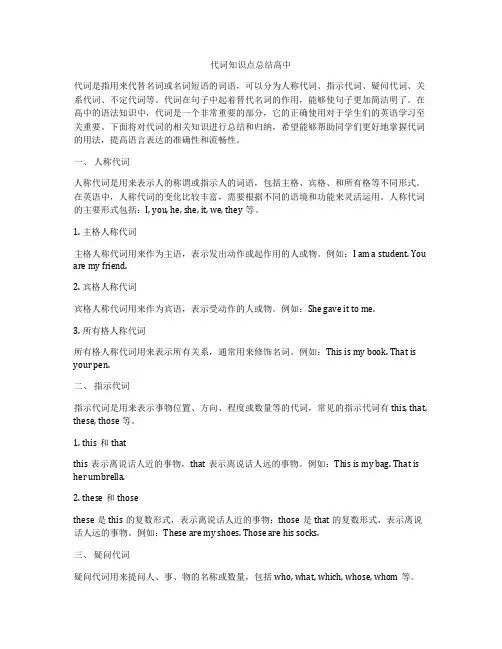
代词知识点总结高中代词是指用来代替名词或名词短语的词语,可以分为人称代词、指示代词、疑问代词、关系代词、不定代词等。
代词在句子中起着替代名词的作用,能够使句子更加简洁明了。
在高中的语法知识中,代词是一个非常重要的部分,它的正确使用对于学生们的英语学习至关重要。
下面将对代词的相关知识进行总结和归纳,希望能够帮助同学们更好地掌握代词的用法,提高语言表达的准确性和流畅性。
一、人称代词人称代词是用来表示人的称谓或指示人的词语,包括主格、宾格、和所有格等不同形式。
在英语中,人称代词的变化比较丰富,需要根据不同的语境和功能来灵活运用。
人称代词的主要形式包括:I, you, he, she, it, we, they等。
1. 主格人称代词主格人称代词用来作为主语,表示发出动作或起作用的人或物。
例如:I am a student. You are my friend.2. 宾格人称代词宾格人称代词用来作为宾语,表示受动作的人或物。
例如:She gave it to me.3. 所有格人称代词所有格人称代词用来表示所有关系,通常用来修饰名词。
例如:This is my book. That is your pen.二、指示代词指示代词是用来表示事物位置、方向、程度或数量等的代词,常见的指示代词有this, that, these, those等。
1. this和thatthis表示离说话人近的事物,that表示离说话人远的事物。
例如:This is my bag. That is her umbrella.2. these和thosethese是this的复数形式,表示离说话人近的事物;those是that的复数形式,表示离说话人远的事物。
例如:These are my shoes. Those are his socks.三、疑问代词疑问代词用来提问人、事、物的名称或数量,包括who, what, which, whose, whom等。
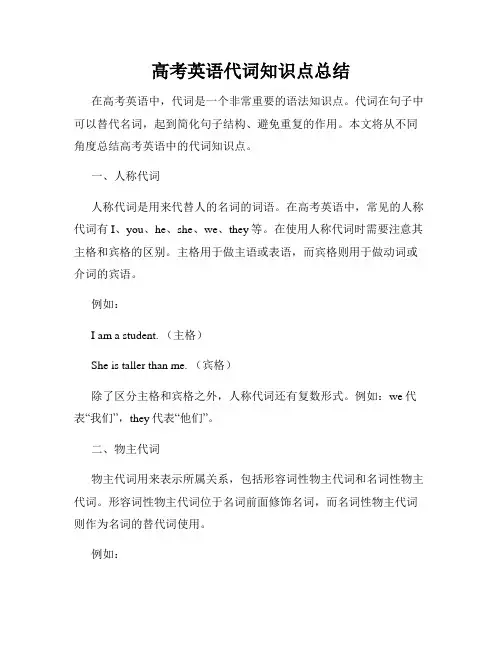
高考英语代词知识点总结在高考英语中,代词是一个非常重要的语法知识点。
代词在句子中可以替代名词,起到简化句子结构、避免重复的作用。
本文将从不同角度总结高考英语中的代词知识点。
一、人称代词人称代词是用来代替人的名词的词语。
在高考英语中,常见的人称代词有I、you、he、she、we、they等。
在使用人称代词时需要注意其主格和宾格的区别。
主格用于做主语或表语,而宾格则用于做动词或介词的宾语。
例如:I am a student. (主格)She is taller than me. (宾格)除了区分主格和宾格之外,人称代词还有复数形式。
例如:we代表“我们”,they代表“他们”。
二、物主代词物主代词用来表示所属关系,包括形容词性物主代词和名词性物主代词。
形容词性物主代词位于名词前面修饰名词,而名词性物主代词则作为名词的替代词使用。
例如:This is my book. (形容词性物主代词)The red one is mine. (名词性物主代词)在使用物主代词时,需要根据名词的单复数和所有格进行变化。
例如,单数名词后加's,复数名词只加'。
三、反身代词反身代词用来指示动作的承受者与动作的发出者是同一个人。
常见的反身代词有myself、yourself、himself、herself、ourselves、themselves等。
例如:He hurt himself while playing football. (他在踢足球时受伤了)另外,反身代词可以用来强调主语:I myself will finish the task. (我自己会完成这个任务)四、指示代词指示代词用来指示人或物的位置、距离和数量等信息。
常用的指示代词有this、that、these、those等。
例如:This is my bag. (这是我的包)Those are my friends. (那些是我的朋友)指示代词还可以与名词连用来修饰名词,表示特指。
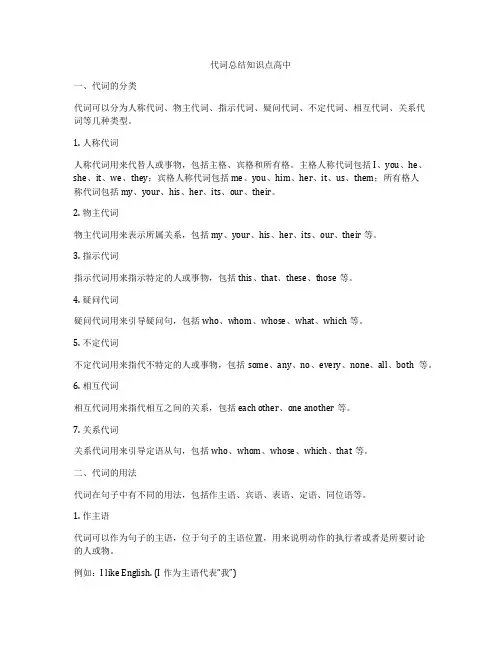
代词总结知识点高中一、代词的分类代词可以分为人称代词、物主代词、指示代词、疑问代词、不定代词、相互代词、关系代词等几种类型。
1. 人称代词人称代词用来代替人或事物,包括主格、宾格和所有格。
主格人称代词包括I、you、he、she、it、we、they;宾格人称代词包括me、you、him、her、it、us、them;所有格人称代词包括my、your、his、her、its、our、their。
2. 物主代词物主代词用来表示所属关系,包括my、your、his、her、its、our、their等。
3. 指示代词指示代词用来指示特定的人或事物,包括this、that、these、those等。
4. 疑问代词疑问代词用来引导疑问句,包括who、whom、whose、what、which等。
5. 不定代词不定代词用来指代不特定的人或事物,包括some、any、no、every、none、all、both等。
6. 相互代词相互代词用来指代相互之间的关系,包括each other、one another等。
7. 关系代词关系代词用来引导定语从句,包括who、whom、whose、which、that等。
二、代词的用法代词在句子中有不同的用法,包括作主语、宾语、表语、定语、同位语等。
1. 作主语代词可以作为句子的主语,位于句子的主语位置,用来说明动作的执行者或者是所要讨论的人或物。
例如:I like English. (I作为主语代表“我”)2. 作宾语代词可以作为句子的宾语,位于动词后面,用来说明动作的承受者。
例如:She loves him. (him作为宾语代表“他”)3. 作定语代词可以作为名词的修饰语,位于名词前面,用来修饰名词。
例如:This is my book. (my作为定语代表“我的”)4. 作表语代词可以作为名词的补语,位于系动词后面,用来表示主语的身份、特征、状态或性质。
例如:She is a teacher. (teacher作为表语代表“教师”)5. 作同位语代词可以作为与名词的同位语,用来进一步说明名词的身份、特征、状态或性质。
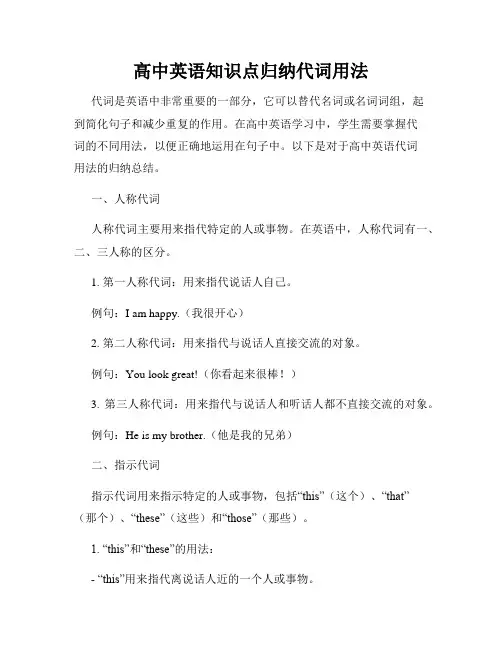
高中英语知识点归纳代词用法代词是英语中非常重要的一部分,它可以替代名词或名词词组,起到简化句子和减少重复的作用。
在高中英语学习中,学生需要掌握代词的不同用法,以便正确地运用在句子中。
以下是对于高中英语代词用法的归纳总结。
一、人称代词人称代词主要用来指代特定的人或事物。
在英语中,人称代词有一、二、三人称的区分。
1. 第一人称代词:用来指代说话人自己。
例句:I am happy.(我很开心)2. 第二人称代词:用来指代与说话人直接交流的对象。
例句:You look great!(你看起来很棒!)3. 第三人称代词:用来指代与说话人和听话人都不直接交流的对象。
例句:He is my brother.(他是我的兄弟)二、指示代词指示代词用来指示特定的人或事物,包括“this”(这个)、“that”(那个)、“these”(这些)和“those”(那些)。
1. “this”和“these”的用法:- “this”用来指代离说话人近的一个人或事物。
例句:This book is interesting.(这本书很有趣)- “these”用来指代离说话人近的多个人或事物。
例句:These flowers are beautiful.(这些花很漂亮)2. “that”和“those”的用法:- “that”用来指代离说话人远的一个人或事物。
例句:That car is expensive.(那辆车很贵)- “those”用来指代离说话人远的多个人或事物。
例句:Those houses are big.(那些房子很大)三、反身代词反身代词用于表示某个动作反射到自己身上,常见的反身代词有“myself”(我自己)、“yourself”(你自己)、“himself”(他自己)等。
1. 反身代词的使用:- 句中的反身代词与句子主语在人称和数上保持一致。
例句:I can do it myself.(我能自己做到)- 反身代词也可用作强调,强调句中的人或事物。
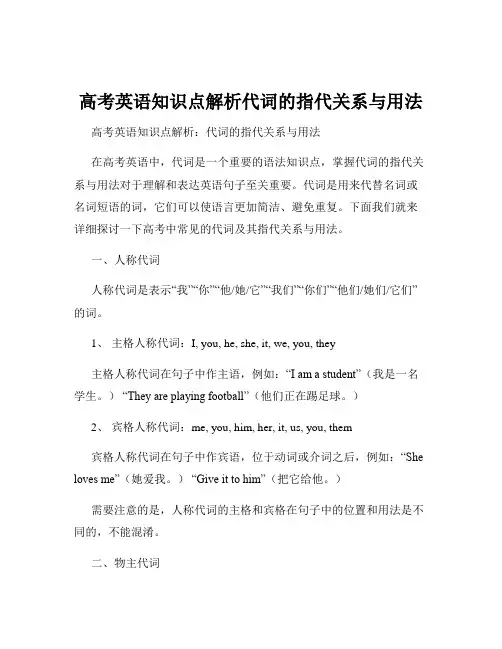
高考英语知识点解析代词的指代关系与用法高考英语知识点解析:代词的指代关系与用法在高考英语中,代词是一个重要的语法知识点,掌握代词的指代关系与用法对于理解和表达英语句子至关重要。
代词是用来代替名词或名词短语的词,它们可以使语言更加简洁、避免重复。
下面我们就来详细探讨一下高考中常见的代词及其指代关系与用法。
一、人称代词人称代词是表示“我”“你”“他/她/它”“我们”“你们”“他们/她们/它们”的词。
1、主格人称代词:I, you, he, she, it, we, you, they主格人称代词在句子中作主语,例如:“I am a student”(我是一名学生。
)“They are playing football”(他们正在踢足球。
)2、宾格人称代词:me, you, him, her, it, us, you, them宾格人称代词在句子中作宾语,位于动词或介词之后,例如:“She loves me”(她爱我。
)“Give it to him”(把它给他。
)需要注意的是,人称代词的主格和宾格在句子中的位置和用法是不同的,不能混淆。
二、物主代词物主代词表示所属关系,分为形容词性物主代词和名词性物主代词。
1、形容词性物主代词:my, your, his, her, its, our, your, their形容词性物主代词具有形容词的性质,其后必须跟名词,例如:“This is my book”(这是我的书。
)“Their classroom is big”(他们的教室很大。
)2、名词性物主代词:mine, yours, his, hers, its, ours, yours, theirs名词性物主代词具有名词的性质,后面不能跟名词,相当于“形容词性物主代词+名词”,例如:“This book is mine”(这本书是我的。
)“The pen is hers”(这支笔是她的。
)在使用物主代词时,要根据句子的语境和表达的需要选择合适的形式。
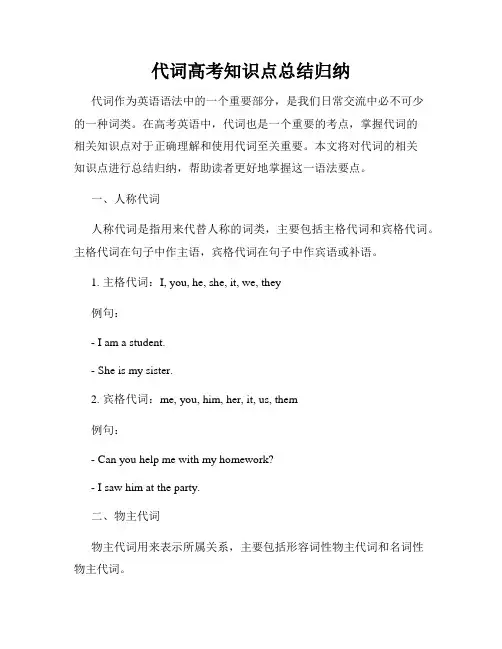
代词高考知识点总结归纳代词作为英语语法中的一个重要部分,是我们日常交流中必不可少的一种词类。
在高考英语中,代词也是一个重要的考点,掌握代词的相关知识点对于正确理解和使用代词至关重要。
本文将对代词的相关知识点进行总结归纳,帮助读者更好地掌握这一语法要点。
一、人称代词人称代词是指用来代替人称的词类,主要包括主格代词和宾格代词。
主格代词在句子中作主语,宾格代词在句子中作宾语或补语。
1. 主格代词:I, you, he, she, it, we, they例句:- I am a student.- She is my sister.2. 宾格代词:me, you, him, her, it, us, them例句:- Can you help me with my homework?- I saw him at the party.二、物主代词物主代词用来表示所属关系,主要包括形容词性物主代词和名词性物主代词。
1. 形容词性物主代词:my, your, his, her, its, our, their例句:- This is my car.- Is this your book?2. 名词性物主代词:mine, yours, his, hers, its, ours, theirs例句:- The red car is mine.- Is this pen yours?三、指示代词指示代词用来指出或代替特定的人或事物,主要包括this, that, these, those等。
1. this和these用于表示离说话人较近的人或事物。
例句:- This is my friend.- These are my new shoes.2. that和those用于表示离说话人较远的人或事物。
例句:- That is his house.- Those are the books I borrowed from the library.四、疑问代词疑问代词用来提问特定的人或事物,主要包括who, whom, whose, what, which等。
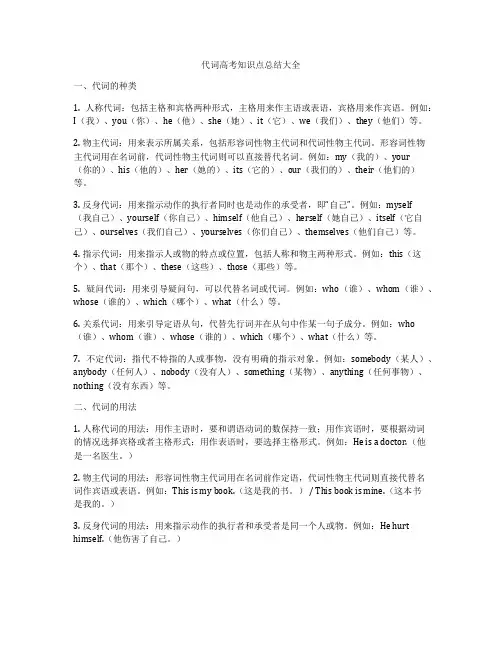
代词高考知识点总结大全一、代词的种类1. 人称代词:包括主格和宾格两种形式,主格用来作主语或表语,宾格用来作宾语。
例如:I(我)、you(你)、he(他)、she(她)、it(它)、we(我们)、they(他们)等。
2. 物主代词:用来表示所属关系,包括形容词性物主代词和代词性物主代词。
形容词性物主代词用在名词前,代词性物主代词则可以直接替代名词。
例如:my(我的)、your(你的)、his(他的)、her(她的)、its(它的)、our(我们的)、their(他们的)等。
3. 反身代词:用来指示动作的执行者同时也是动作的承受者,即“自己”。
例如:myself(我自己)、yourself(你自己)、himself(他自己)、herself(她自己)、itself(它自己)、ourselves(我们自己)、yourselves(你们自己)、themselves(他们自己)等。
4. 指示代词:用来指示人或物的特点或位置,包括人称和物主两种形式。
例如:this(这个)、that(那个)、these(这些)、those(那些)等。
5. 疑问代词:用来引导疑问句,可以代替名词或代词。
例如:who(谁)、whom(谁)、whose(谁的)、which(哪个)、what(什么)等。
6. 关系代词:用来引导定语从句,代替先行词并在从句中作某一句子成分。
例如:who (谁)、whom(谁)、whose(谁的)、which(哪个)、what(什么)等。
7. 不定代词:指代不特指的人或事物,没有明确的指示对象。
例如:somebody(某人)、anybody(任何人)、nobody(没有人)、something(某物)、anything(任何事物)、nothing(没有东西)等。
二、代词的用法1. 人称代词的用法:用作主语时,要和谓语动词的数保持一致;用作宾语时,要根据动词的情况选择宾格或者主格形式;用作表语时,要选择主格形式。
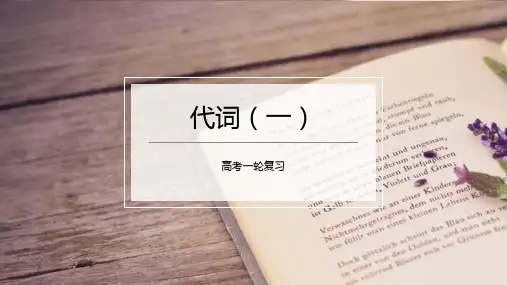
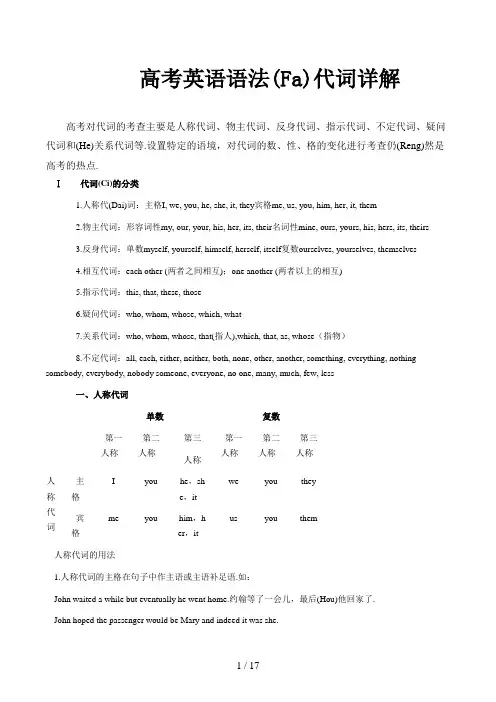
高考英语语法(Fa)代词详解高考对代词的考查主要是人称代词、物主代词、反身代词、指示代词、不定代词、疑问代词和(He)关系代词等.设置特定的语境,对代词的数、性、格的变化进行考查仍(Reng)然是高考的热点.Ⅰ代词(Ci)的分类1.人称代(Dai)词:主格I, we, you, he, she, it, they宾格me, us, you, him, her, it, them2.物主代词:形容词性my, our, your, his, her, its, their名词性mine, ours, yours, his, hers, its, theirs3.反身代词:单数myself, yourself, himself, herself, itself复数ourselves, yourselves, themselves4.相互代词:each other (两者之间相互);one another (两者以上的相互)5.指示代词:this, that, these, those6.疑问代词:who, whom, whose, which, what7.关系代词:who, whom, whose, that(指人),which, that, as, whose (指物)8.不定代词:all, each, either, neither, both, none, other, another, something, everything, nothing somebody, everybody, nobody someone, everyone, no one, many, much, few, less一、人称代词单数复数第一人称第二人称第三人称第一人称第二人称第三人称人称代词主格I you he,she,itwe you they宾格me you him,her,itus you them人称代词的用法1.人称代词的主格在句子中作主语或主语补足语.如:John waited a while but eventually he went home.约翰等了一会儿,最后(Hou)他回家了. John hoped the passenger would be Mary and indeed it was she.说明:在复合(He)句中,如果主句和从句主语相同,代词主语要用在从句中,名词主语用在主句中.Whe n he arrived,John went straight to the bank.约(Yue)翰一到就直接去银行了.2.人称代词的宾格在句子(Zi)中作宾语或介词宾语,但在口语中也能作主语补语,第一人称在省略句中,还可以作主语.如(Ru):I saw her with them;at least,I thought it washer.(第一个her作动词宾语,them作介词宾语,第二个her作表语)—Who broke the vase?谁打碎了花瓶?—Me.我.3.人称代词之主、宾格的替换(1)宾格代替主格在简短对话中,当人称代词单独使用或在not 后,多用宾语.—I like English..—Me too.—Have more wine?—Not me..在表示比较的非正式的文体中,常用宾格代替主格. 但如果比较状语的谓语保留,则主语只能用主格.He is taller than I/me. He is taller than I am.2)主格代替宾格在介词but,except后,有时可用主格代替宾格.在电话用语中常用主格.—I wish to speak to Mary..—This is she.注意:在动词be 或to be后的人称代词视其前面的名词或代词而定.I thought it was she.我以为是她.(主格——主格)I thought it to be her.(宾格——宾格)I was taken to be she.我被当成了她.(主格——主格)They took me to be her.他们把我当成了她.(宾格——宾格)4.代词的指代问题1)不定代词 anybody,everybody,nobody,anyone, someone, everyone,no one,及whoever和person在正式场合使用时,可用he,his,him代替.如:Nobody came,did he?2)动物名(Ming)词的指代一般用it或they代替,有时也用he,she,带有亲切的感情色彩.如(Ru):Give the cat some food.She is hungry..3)指代车(Che)或国家,船舶的名词,含感情色彩时常用she.5.并列人称代词(Ci)的排列顺序1)单数人称代(Dai)词并列作主语时,其顺序为:第二人称→ 第三人称→第一人称,即you→ he/she; it → I.如:You,he and I should return on time.你,他还有我应该按时回来.2)复数人称代词作主语时,其顺序为:第一人称→ 第二人称→第三人称,即we→you→they.在下列情况中,第一人称放在前面.在承认错误,承担责任时.It was I and John that made herangry.是我和约翰惹她生气了.在长辈对晚辈,长官对下属说话时,如长官为第一人称,如:I and you try to finish it.并列主语只有第一人称和第三人称时.当其他人称代词或名词被定语从句修饰时.二、物主代词物主代词是表示所有关系的代词,也可叫做代词所有格.物主代词分形容性物主代词和名词性物主代词两种,其人称和数的变化见下表.单数复数第一人称第二人称第三人称第一人称第二人称第三人称物主代词形容词性my your his,her,its our your their名词性mine your shis,hers,itsours yours theirsOur school is here,and theirs is there.我们的学校在这儿,他们的在那儿.1.物主代词的用法1)物主代词既有表示所属的作用又有指代作用.如:John had cut his finger; apparently there was a broken glass on his desk.?2)物主(Zhu)代词有形容词性(my,your等)和名词性(mine,yours等)两种,形容词性的物主代词属于限定词.名词性的物主代词在用法上相当于省略了(Liao)中心名词的’s属格结构.如(Ru):Jack’s cap意(Yi)为The cap is Jack’s .His cap意(Yi)为The cap is his.2.名词性物主代词的句法功能1)作主语.如:May I use your pen? Yours works better.2)作宾语.如:I love my motherland as much as you love yours.3)作介词宾语.如:You should interpret what I said in my sense of the word,not in yours.4)作表语.如:The life I have is yours.It’s yours.It’s yours.3.双重所有格物主代词不可与a,an,this,that,these,those,some,any,several,no,each,every,such,another ,which等词一起前置,修饰一个名词,而必须用双重所有格.公式为:a,an,this,that+名词+of+名词性物主代词.三、指示代词指示代词表示“那个”“这个”“这些”“那些”等指示概念的代词.指示代词有this,that,these,those等.如:That is a good idea.指示代词的用法1.指示代词分单数(this/that)和复数(these/those)两种形式,既可作限定词又可作代词.2.指示代词的句法功能.1)作主语.如:This is the way to do it.2)作宾语.如:I like this better than that.3)作表语.如:My point is this.4)作介词宾语.如:I don’t say no to that. There is no fear of that.说明1:指示代词在作主语时可指物也可指人,但作其他句子成分时只能指物,不能指人.如:(对)Th at is my teacher.那是我的老师.(that作主语,指人)(对)He is going to marry this girl.他要和这个姑娘结婚.(this作限定词)(错)He is going to marry this.(this作宾语时(Shi)不能指人)(对)I bought this.我买这(Zhe)个.(this指物,可作(Zuo)宾语)说明2:that和those可作定语从句的先行词,但this和these不能,同时,在作先行词时,只有those可指人,试比较(Jiao):(对)He admired that which looked beautiful.(对) He admired those who looked beautiful.他赞赏(Shang)那些外表漂亮的人.(those指人)(错) He admired that who danced well.(that作宾语时不能指人)(对)He admired those who danced well.他赞赏跳舞好的人.(those指人)(对)He admired those which looked beautiful.他赞赏那些外表漂亮的东西.(those指物)四、反身代词表示“我自己”“你自己”“他自己”“我们自己”“你们自己”和“他们自己”等的代词,叫做自身代词,也称为“反身代词”.如:She was talking to herself.她自言自语.反身代词单数复数第一人称第二人称第三人称第一人称第二人称第三人称myself yourself himselfherselfitselfourselves yourselves themselves反身代词的用法1.作宾语,如1)有些动词需有反身代词,如absent,bathe,amuse,blame,dry,cut,enjoy,hurt,introduce,behave等.如:We enjoyed ourselves very much last night.Please help yourself to some fish.2)用于及物动词+宾语+介词,如:take pride in,be annoyed with,help oneself to sth等.I could not dress(myself)up at that time.注:有些动词后不跟反身代词,如:get up,stand up,wake up等.Please sit down.2.用作表语.如.I am not myself today.3.用作(Zuo)同位语.如(Ru)The thing itself is not important.4.在不(Bu)强调的情况下,but,except,for 等介词后宾语用反身代词或人称代词宾格均可.注(Zhu)意:1)反身代词本身不能单独作(Zuo)主语.(错)Myself drove the car.(对)I myself drove the car.我自己开车.2)但在and,or,nor连接的并列主语中,第二个主语可用反身代词,特别是myself 作主语.Charles and myself saw it.查尔斯和我看见了这件事.五、相互代词表示相互关系的代词叫相互代词,有each other和oneanother两个词组.他们表示句中动词所叙述的动作或感觉在涉及的各个对象之间是相互存在的.如:It is easy to see that the people of different cultures have always copied each other.,相互借鉴的相互代词宾格each other,one another所有格each other’s,one another’s相互代词的句法功能1.作动词宾语.如:People should love one another.人们应当彼此相爱.2.可作介词宾语.Dogs bark,cocks crow,frogs croak to each other.犬吠、鸡鸣、蛙儿对唱.说明:传统语法认为,相互关系存在于两个人或物之间用each other,存在于两个以上人和物之间用one another.现代英语中,两组词交替使用的实例也很多.He put all the books beside each other/one another.他把所有书并列摆放起来.Usually these small groups were independent of each other.这些小团体通常是相互独立的.3.相互代词可加’s构成所有格.如:The students borrowed each other’s notes.六、不定代词不是指明代替任何特定名词的代词叫做不定代词.常见的不定代词有all,both,each,every等,以及含有some,any,no等的合成代词,如anybody,something,noone.这些不定代词大都可以代替名词和形容词,在句中作主语、宾语、表语和定语,但none和由some,any ,no等构成的复合不定代词只能作主语、宾语或表语;every和no只能作定语.如:—Do you have a car?— Yes,I have one.—I don’t know any of them.他们,Ⅱ代词的用法1. nothing, none, no onenone作为代词,最常用来表示数量,它可以(Yi)是一个可数的概念(howmany)也可以是一个不可数的概念(howmuch),或者any引起的问题;而nothing是相对于something(有某物)什么都没有,它回答的是“What isin/on...”的问题;而no one=nobody没有人,它回答的是“Who didthat?”(谁……)或是anyone(有没有人)的问题.2. one, ones, that, those, it(1)one和ones可以(Yi)用来代替前面提到过的可数名词,one代单数(Shu),ones代复数,其(Qi)中:两者都可以指代物(Wu)(只要是可数)one前面一般不加a,因为它本身有“一个”的意思,但如果one前面有形容词修饰,则需要加a/an.one可以单独使用,意思为“任何人”.例如:—Shall we have a rest?—Didn’t we just have one?(因为one=a something)One should always believe in oneself.(2)that与those:that可以代替前面提到的不可数名词或可数名词单数(相当于the one;而those代替前面提到的复数名词,有时可以用the ones替换.例如:The population of China is bigger than that of India. (that=the population)The boy told his story and that of the girl next room.(that=the story)The cell phones we made nowadays are better than those/the ones made 2 years ago.(those=the cell phones=the ones)(3)one和(He)it:两者都可以用来代替前(Qian)面出现过的单数名词,one指这类东西中(Zhong)的任何一个,指类属,泛指.it指前面(Mian)所指的同一物.例(Li)如:I need a pen to sign my name. Can I have one? (one =a pen) I cannot find my new pen. Have you seen it?(it指那支新钢笔)3. another, the other, other, others, the others(1)another和the other:两者都是“另一个”的意思,但数量上有区别:用another指两个以上的数量,而theother只指两个中的另一个,例如:He has three brothers, one is a teacher, another is a doctor and the third is an engineer.注:another除了可以作代词,还可以用作形容词.这里有必要区别another, theother和more的用法:①another:another表“另一个”时只跟可数名词单数,而表“另外的、额外的、附加的”时,可跟带有few或具体数字的复数名词,此时可把“数词+复数名词”看作是一个整体.例如:—Have you finished your report yet?—No,I will finish it in another 10 minutes.There is room for another few people in the back of the bus.②other:表“另外的”接复数名词,如与具体数词连用,则置于数词之后,但与定冠词the连用时,other要放在数词前.例如:Tony is going camping with two other little boys next Sunday.Do you know where he found the other two photos?③more:more一般位于数词之后,名词之前,有时也可置于名词之后.例如:One more step(One step more),and I’ll shoot you.Where shall we be in ten more years?more除跟数词外,还可与many, a little,a few,a lot,several等词连用,例如:There are many more dictionaries on the desk.Would you like some more tea?(2) others, the othersothers是相对于(Yu)some来说的:some...some....others...(一些(Xie)……一些……另一些……)是泛指;而(Er)the others是特(Te)指另一些,相对于ones(可以理解为one, the other的(De)复数).例如:Class 1 are cleaning the classroom. Some are sweeping the floor, some are cleaning the window, and others are washing the blackboard. (泛指)There are only 20 students in the classroom, where are the others.(特指)4. both, other, neither, each, any, allboth:两者都,谓语动词用复数;either:两者中间的任何一个,谓语动词用单数;neither:两者中间无任何一个,谓语动词多用单数,也可以用复数;each:两个或两个以上中的每一个,谓语动词用单数;any:三者或三者以上中的任何一个,谓语动词用单数;all:三者或三者以上全部;5. some, any, nosome属于肯定词,主要用于肯定句中,但当说话人期待肯定回答时,也可以用于疑问句中.例如:Could I have some more tea, please? Would you like some more coffee?any属于非肯定词,主要用于否定句、疑问句或条件句中.它可以与形容词的比较级连用.例如:D on’or I’ll shoot!no属于否定词,用于否定句中:no+可数名词单数=not a/an no+可数名词复数=notany.例如:There is no such thing as a free lunch in the world.【考点诠释】纵观历年高考试题,代词的主要考点主要集中在以下几个方面:不定代词one,the one,ones,the ones;物主代词的用法;人称代词主格和宾格的用法;表示两者和多者的不定代词的比较;指示代词this,that,these,those,it的用法;another,(the)other(s),else;the rest的用法;every-,some-,any-,no-与-thing,-one,-body构成的复合不定代词的用法.考点1 人(Ren)称代词一般地说人称代词作主语时用主格;作宾语时用宾格;作定语时用形容词性物主代词;名词性物主代词可以(Yi)代替“形容词性物主代词+名词”.但口语中,在无动词的句子里,往往用代词的宾格(Ge)形式.1.用于无谓(Wei)语的句子中一Dpes any of you know why Jack hasn’?一Me..答语如果带谓语,就(Jiu)得用主格,如:I can.和I do,too./So do I.2.表示惊奇、猜疑、反问、不满、厌烦等①Do you have good eyesight,young man?一Me?I can see a sparrow two hundred paces away.②What?Me fight a big chap like him?Not me!3.代替as,than等连词之后的主格(多用于口语中,尤其用于句末)①I’m not as tall as him(he)..②)She is much more careful than me(I).她比我细心得多.当这类人称代词带有all,both等同位语时,用宾格的形式就更为常见了.如:He works harder than us a11.典例:Our neighbers gave a baby bird yesterday that hurt when it fell from its nest. A.us;it B.us;itself C.ourselves;itself D.ourselves;it考点2指不代词1.this/these,that/thosethis,these指代下面要说的内容;that,those指代上面陈述过的内容.如:①What I’d like to say about how to improve our spoken English is like this.②That’sa11.Thank you.③Salaries are higher here than those in my hometown.2.一些习惯说法中this和that的用法比较固定①Who’s that?你是谁?②)This is Mary.③11at’s all right/OK..(对感谢的答语)④nat’S nothing..(对道歉的答语) ‘⑤That’s that.(表示决定不能更改)⑥That’S a11.就这些了.⑦That is…那就是……3.this,that有时可以用作副词,意为“这么,那么”,用在形容词或副词前作状语,表示程度It isn’t that cold.还(Huan)没那么冷.考点3不(Bu)定代词以下是几组(Zu)易混不定代词:1.some类不定代(Dai)词与any类不定代词(1)some类不定代词多用于肯定句中(Zhong);any类的多用于疑问句、否定句和条件状语从句中.如:Raise your hands if you have any questions.如果你们有问题,请举手.(2)但在表示客气的请求或希望对方给予肯定回答的疑问句中,要用some类的不定代词.如:Would you like something to drink?你要喝点什么吗?(3)any类的不定代词用在肯定句中,表示“任何(一个);任何事情;无论什么”.如:She promised that she could do anything for you.她许诺能为你做任何事情.2.all,both,neither,none(1)all指三者或三者以上“都”,both指两者“都”.如:①Both(of)his hands were wounded.②All(of)his fingers were wounded.(2)neither表示“两个都不”,常和of连用,放在带有冠词、物主代词或指示代词的复数名词之前,作主语时,谓语动词可以用单数或复数;none表示三个或三个以上“都不”,可用于人,也可用于物,后可接of短语,与复数名词、代词或单数集合名词连用作主语,指人时,谓语动词用单、复数皆可;指物时,只用第三人称单数形式.如:①Neither of the twins is/are correct.②None of us has/have ever been to the Great wall.3.any,either,each,every(1)any一般用于否定句、疑问句和条件句中.也可用在肯定句中,以加强语气,表示“任一”的概念;还可以用来修饰可数名词单数,表示三者或三者以上中的“任何一个”.如:I didn’t eat any meat.我一点儿肉也没吃.4.no,none,nothing,nobody(1)no不能单独使用,相当于not a或not any,作定语修饰可数名词或不可数名词.如:You have no sympathy for the sufferings of others.你对别人的痛苦没有同情心.(2)none既可以指人,也可以指物,侧重指三者或三者以上的人或物,用于回答how many/much引导的疑问句,可与介词of连用.如:①None of the books is suitable for the young.这些书都不适合(He)年轻人读.②一(Yi)How many people are there in the room?一None.没人.(3)nobody指人,用于回答who引导的疑(Yi)问句;nothing指物,用于回答what引导的疑问句.如(Ru):一(Yi)Who is in the room?谁在屋内? 一Nobody.没有人.5.it,one,ones, that和those(1)it特指上文所提到的同一个物,它所代替的名词常由the,this,that等修饰.one指上文提到的同类事物中的一个,不特指,被指代的名词通常由不定代词some或any修饰.如:①Where is that book?I can’t find it.那本书在哪儿?我找不到它.②I haven’t got any erasers.Will you please give me one?我没有橡皮,请你给我一块好吗?(2)one与that都可用来代替上文中出现的名词,one前要用定冠词the,有时that和the one可互换使用.如:The book isn’t so interesting as the one/that you borrowed.(3)但that和one在多数情况下是不能互换的,主要区别在于:that既可代替可数名词,也可代替不可数名词,常要求有后置定语,一般不指人,复数形式为those.one只能代替可数名词单数,复数形式为ones.当可数名词前有形容词修饰时,只能用one,不用that.当of短语作可数名词的后置定语时,用that,不用one.如:①The best cigarettes are those from Yunnan.②The boy told me his story and that of the girl next door.Your coat is blue,and my new one is green.你的大衣是蓝色的,我的新大衣是绿色的.(4)the ones用来代替上文提到的特指的复数名词,有时可以用those代替,尤其在有后置定语的情况下.如:The books on the desk are better than those/the ones under the desk.6.another,other,others,more(1)another既可以单独使用,也可以用于单数名词前,泛指三者或三者以上中的“另外一个人或物”.还可以用“another+数量词+复数名词”,表示”再,又”.如:①was there another way out? ②we’d better wait another five mi nutes.特别提示表示“另外一个学生”只能用another student,不能说成another one student.(2)other不能单独使用,应用于复数名词前,表示另外的某些人或物,也可以用在some,any,no之(Zhi)后,或具体数词之后,再接名词,构成”不定代词或具体数词+other+名词”;接单数名词时,还可以用在冠词the后,特指两个人或物中的另外一个(可以省略为the other),或特指另外的某些人或物(可以省略为the others),others泛指”其他的(事物),别人”.如(Ru):Done remained and the other went away.②We should learn to treat others as equals.7.something,anything,everything,nothing(1)something一般用在肯定句中(Zhong),也可以用在表示邀请、征询意见的委婉问句中.如(Ru):Could you do something for me?请为我(Wo)做点事好吗?(2)anything用在否定句、疑问句或条件句中.如:There isn’t anything inside.(3)everything意为”一切事物”,可用在肯定句或疑问句中.用于否定句时,表示部分否定;表示全部否定时要用nothing或not anything.如:Everything is good when new,but friends when old.东西是新的好,朋友是老的亲.(谚语)(4)nothing表示”什么也没有”,常用于陈述句,表示否定意义,不能与否定词连用.如:①Do nothing by halves.凡事不可半途而废.(谚语)②Fools learn nothing from wise men,but wise men learn much from fools.愚者不学无术,智者不耻下问.(谚语)典例1:(2010高考英语江西卷,27)Swimming is my favorite sport. There is _______ like swimming as a means of keeping fit.A somethingB anythingC nothingD everything【答案】C【解析】考查不定代词.句意:游泳是我最爱的运动.再没有比游泳更好的锻炼方式了.There is nothing like…意即”没有什么能像……了”.典例2:(2009陕西)Jane was asked a lot of questions,but she didn’t answer of them.A.other B.any C.none D.some典例3:(2009江苏 of their parents.A.those B.one C.both D.that解析D 句意:十分之九的家长认为他们教育孩子的方法和他们父母的教育方法有明显(Xian)的差别.在同一句话(Hua)中,指代的名词和前面提到的名词是同一类,即同名异物,要用that.考点4 反身代(Dai)词1.反身代词在句中可以作宾语、表语、并列主语,以及名(Ming)词、代词的同位语①The text itself is very easy.(作(Zuo)主语的同位语)②(Either)Jane or yourself will go there..(作并列主语,但不能单独作主语)③He is not laughed at that laughs at himself first.[谚]自嘲者不会让人嘲笑. ④Respect yourseff,or no one else will respect you.[谚]要人尊敬,必须自重.2.主语与宾语是同一个人时,应当用反身代词teach oneself,enjoy oneself,help oneself,throw oneself,look after oneself3.在系动词后作表语,常用于否定句,表示身体不适I don’t know what’S the matter with me.I’m not myself today.4.用在交际英语中①Help yourseff!②Make yourself at home!③Don’t upset yourself!5.辨别几组搭配by oneself独自for oneself独自地,靠自己的力量;of oneself~t动地;to oneself独占,典例:Isn’t it amazing how the human body heals after an injury?A.hireself B.him C.itself D.it考点5 it的用法在英语中,运用it的场合较多.从它在句中的作用和意义来看,it的用法可分为三类:1.指代作用(1)用作人称代词,代替前文或后文所提到的同一事物(单数可数名词或不可数名词).如:Although we cannot see it,there is air all around us.(2)代替前面的整个句子.如:It is said that he has died of a disease,but it isn’t true.(3)用在答语中代替指示代词this,that.如:一What is this?这是什么? 一It’s a bike.(4)代替不能或没有必要区分性别的或某些习惯说法中的人.如:①The baby cried because it Was hungry.婴儿哭是因为饿了.(婴儿习惯上不区分性别)②一Who is knocking at the door? 一It’s me.(5)指环境(Jing)、情形等.如(Ru):①I can’t stand it any longer.我再也不能容忍这种情况(Kuang)了.②Take it easy.别(Bie)紧张.(6)指度量衡单位、时间、距离、季节、天气及(Ji)自然现象.如:①It’s getting colder and colder now.现在越来越冷了.②It is winter now.现在是冬天了.2.形式作用(1)形式主语当动词不定式、v.ing形式或从句作主语时,通常把它们放在谓语之后,而用it作句子的形式主语.如:(I)It’s no use crying over spilt milk.[谚]覆水难收.②It takes three generations to make a gentleman.[谚]十年树木,百年树人.(2)形式宾语当复合宾语中的宾语是不定式、v-ing形式或宾语从句时,往往把真正的宾语放在补足语后面,而用it作形式宾语,放在宾语补足语之前.如:①You must make it clear to them that the situation is serious.②)They thought it difficult to talk to the guests about the recent events.特别提示形式宾语用在“主语+谓语动词+宾语”结构中,谓语动词appreciate,dislike,hate,like,love,make(按时到达,成功)等后接由if或when等引导的从句时,往往在从句前加形式宾语it.如:①1 would appreciate it if you paid in cash.如果你能支付现金的话,我会不胜感激.②The boy likes it when you do that.那个男孩喜欢你那样做.3.强调作用it可以用来改变句子的结构,使句子的某一成分得到强调.强调句型的基本结构为:Itis/was+所强调的成分+that/who/whom+其他成分.【高考链接】1If our parents do everything for us children, we won't learn to depend onA. themselvesB. themC. usD. ourselves【答案】D主语为we,因此应为ourselves. depend on oneself:自力更生.2. (2010高考英语重庆卷,23)He had lost his temper and his health in the war and never foundof them again.A. neitherB. eitherC. eachD. all【答(Da)案】 B.由his temper and his health可以排除CD,由后面的never表否定,选(Xuan)either,never/not either是全部否定,相当于neither.3. that’s important is that you are doing your best and moving in the right direction.A.One B.All C.EverythingD.AnythingB此处All that's important相当于What's important,在主句中(Zhong)作主语,表示“重要的是……”4. (2010高考英语(Yu)天津卷,6)in my life impressed me so deeply as my first visit to the PalaceMuseum. A. Anything B. Nothing C. Everything D. Something5.(2010高考英语四(Si)川卷,7)On my desk is a photo that my father took of when I was ababy. A. him B. his C. me D. mine【答案】Ctake a photo of sb意为给某人照相,此处应用人称代词的宾格.6.t is said that two man-made structures are clearly visible from space. One is the Great Wall ofChina, and is Japans Kansai International Airport.A.another B.other C.the other D.either【答案】C.两者中的一个用one,两者中的另一个用the other,上句有提示two man—made structures,所以用one…the other结构.7.(The cost of renting a house in central Xi’an is higher than ____ in any other area of the city. A.that B. this C. it D. one【答案】A在西安市中心租一套房子的费用比在该市任何其他地区租一套房子的费用都要高.根据句意可知,空处指代The cost of renting a house,应该用that.8.Helping others is a habit, _______ you can learn even at an early age.A. itB. thatC. whatD. one9.The fact that she was foreign made _____difficult for her to get a job in that country A soB. muchC. thatD. it【答案】D题(Ti)干中含有make it difficult for sb to do sth结构.形式宾语it代(Dai)替后面的动词不定式短语to get a job in that country.10.Swimming is my favorite sport. There is _______ like swimming as a means of keeping fit.A somethingB anythingC nothingD everything【答案】C句意:游泳是我(Wo)最爱的运动.再没(Mei)有比游泳更好的锻炼方式了.There is nothing like…意即”没有什么能像(Xiang)……了”.11When you introduce me to Mr. Johnson, could you please say for me ?A. everythingB. anythingC. somethingD. nothing【答案】 C.A项意为:“每件事”,B项意为“任何事”;C项意为“某事”;D项意为“没什么”.句意为:“当你把我介绍给约翰逊先生时,请为我说话吧.”something用在问剧中表示建议或请求,期望得到肯定或者所问问题可能性很大时.12.'ll spend half of my holiday practicing English and half learning drawing.A. anotherB. the otherC. other’sD. other【答案】B句意:假期我会把一半时间用于练习英语,另一半用于学习绘画.half表示“一半”,the other half表示“另一半”.the other指两个事物中的“另一个”.13The doctor thought ____ would be good for you to have a holiday.A. thisB. thatC. oneD. it14.Neither side is prepared to talk to _____ unless we can smooth thing over between them.A. othersB. the otherC. anotherD. one other【答案】 B句意为:“双方都不准备和对方交流,除非我们能做一些调停的(De)事情.”首先注意本句的Neither说明问题是出在两个对立方,而双方不打算作出让步(Bu),所以这里选B,the other指两者中的另一方.而another指的三者(Zhe)或三者以上;others是针对两大类人的,常与some对应,没有one other的说法.15You are a team star! Working with is rally your cup of tea.A. both B.either C. others D.the other答(Da)案:1.D 2.B 3.B 4.B 5.D 6.B 7.D 8.C 9.A 10.B 11.B 12.B 13.C 14.B 15.D 16.D 17.B 18.B19.D 20.B 21.A 22.C 23.A 24.A 25.C 26.D 27.D 28.A 29.C 30.C 31.A 32.A 33.C 34.A 35.D 36.A37.A 38.A 39.B 40.D 41.B 42.C 43.B 44.C 45.D 46.C 47.D4 8.B 49.B 50.D参(Can)考答案:1-5 ADAAB 6-10 CBAAC 11-15 BACCB 16-20 BBBDD21-25 DCCCB 26-30 DCBAD 31-35 CCABA 36-40 ADBCB41-45 CCDBD 46-50 CADAC 51-53 CCB。
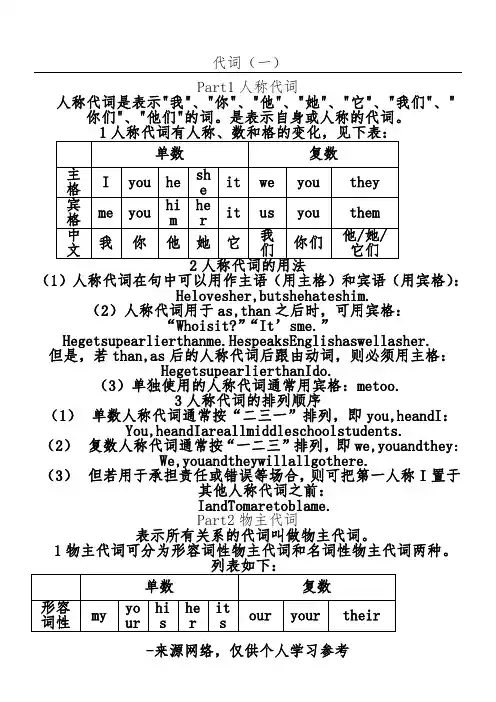
代词(一)Part1人称代词人称代词是表示"我"、"你"、"他"、"她"、"它"、"我们"、"你们"、"他们"的词。
是表示自身或人称的代词。
(::I置于Part2物主代词表示所有关系的代词叫做物主代词。
1物主代词可分为形容词性物主代词和名词性物主代词两种。
(1)形容词物主代词在句中作定语:Ilovemycountry.Isthisyourcar?(2)名词性的物主代词可用作主语,宾语,表语以及与"of"连接:物的代词。
主要的有this,that,these,those,其中this和that 为单数,these和those为复数。
指示代词在句中可作主语、宾语、表语、定语。
指示代词的用法:1this和that的用法两者的基本区别是this表近指,that表远指。
另外,当要回指上文提到的事情时,可用this或that,但是若要指下文叙述的事情,通常要用this:ShemarriedJim,andthis/thatsurprisedme.Iwanttoknowthis——Doseheloveher?2that和those的用法that和those常常用来代替已提到过的名词,以避免重复。
ThepopulationofChinaislargerthanthatofJapan.Theearsofarabbitarelongerthanthoseofafox.Part5相互代词相互代词是表示相互关系的代词,主要有who的意义为“谁”,既可以做单数,也可以指复数。
在句中主要做主语和宾语。
whom是who的宾格,在句中主要做动词宾语和介词宾语,做动词宾语时whom可与who互换使用,但作介词宾语时只能用whom;whose是who的所有格形式,意为“谁的”:Whosaidthat?Whomareyouwaitingfor?Whom/Whohaveyouchosentotakepartinthesportsmeet?Idon’tknowwhoseitis.what与whichwhich和what都指物。
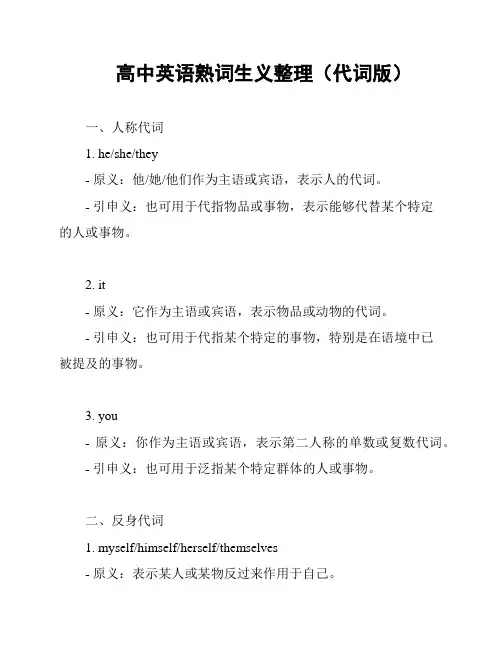
高中英语熟词生义整理(代词版)一、人称代词1. he/she/they- 原义:他/她/他们作为主语或宾语,表示人的代词。
- 引申义:也可用于代指物品或事物,表示能够代替某个特定的人或事物。
2. it- 原义:它作为主语或宾语,表示物品或动物的代词。
- 引申义:也可用于代指某个特定的事物,特别是在语境中已被提及的事物。
3. you- 原义:你作为主语或宾语,表示第二人称的单数或复数代词。
- 引申义:也可用于泛指某个特定群体的人或事物。
二、反身代词1. myself/himself/herself/themselves- 原义:表示某人或某物反过来作用于自己。
- 引申义:也可表示自我行为的主体和客体为同一个人或物。
2. itself- 原义:表示某物反过来作用于自己。
- 引申义:也可表示自我行为的主体和客体为同一个物体。
三、指示代词1. this/that- 原义:用于指示离说话人近或远的人、物或事。
- 引申义:也可用于指示上下文中提及的某个特定的人、物或事。
2. these/those- 原义:用于指示离说话人近或远的多个人、物或事。
- 引申义:也可用于指示上下文中提及的某些特定的人、物或事。
四、不定代词1. someone/anyone/no one/everyone- 原义:指代某个人,表示不确定的人或泛指的人。
- 引申义:也可用于指代某个特定的人,根据上下文语境进行推测。
2. something/anything/nothing/everything- 原义:指代某个物,表示不确定的物或泛指的物。
- 引申义:也可用于指代某个特定的物,根据上下文语境进行推测。
以上是高中英语熟词生义整理的代词版,希望能够对你的学习有所帮助。
四维教育代词的用法详解代词分为:人称代词;物主代词;反身代词;相互代词;指示代词;疑问代词;关系代词;连接代词;不定代词。
Ⅰ.人称代词主格:I you he she it we you they宾格:me you him her it us you them1.人称代词的用法1)作主语(作主语时用主格)We love our country.我们热爱我们的祖国。
You cannot eat your cake and have it.鱼与熊掌不可兼得。
2)作宾语(作宾语时用宾格)Winnie is a nice girl. We all like her.温妮是个好姑娘。
我们都喜欢她。
Tell him to call back later.告诉他过一会儿回电话。
3)作表语(在口语中用宾格)If I were her, I would stay.要是我是她,我就留下来。
Don’t blame Tom. It’s me who broke it.别怪汤姆,是我打破的。
2. 人称代词的宾格代替主格的几种场合1)在日常生活中,人称代词作表语时,常用代词的宾格。
A: Who is knocking at the door?谁在敲门呀?B: It’s me.是我。
2)口语中,当人称代词孤立地用于不带谓语的句子中作主语时,常用代词的宾格。
A: I don’t want to go to the theater tonight.今晚我不想去剧院。
B: Me neither.我也不想去。
A: I’d like to stay here for another week.我想在这里再呆一周。
B: Me too.我也是。
3)在带as 和than 的比较级后面,许多场合下用代词的宾格。
She knows me as well as him.她像了解他一样了解我。
He is taller than me.他比我高。
4)口语中,当人称代词用于带有强烈感情色彩的句子中作主语且其后不带宾语时,多用代词的宾格。
高中英语知识点归纳代词的人称格和指示用法代词是英语中的重要词类之一,用于替代名词,可以简化句子结构,使语言更加流畅。
代词的人称格和指示用法对于正确理解和运用代词至关重要。
接下来,将详细归纳高中英语中的代词的人称格和指示用法。
一、人称格代词人称格代词是用于代替特定人或物的代词。
英语中的人称格代词有第一人称、第二人称和第三人称,分别代表了说话人、被说话人和其他人或物的角色。
1. 第一人称代词第一人称代词用于代替说话人,包括主格、宾格和所有格,分别表示主语、宾语和所有者。
主格:I(我)例句:I am a student.(我是一个学生。
)宾格:me(我)例句:Can you help me?(你能帮助我吗?)所有格:my(我的)例句:This is my book.(这是我的书。
)2. 第二人称代词第二人称代词用于代替被说话人,同样包括主格、宾格和所有格。
主格:you(你)例句:You are my best friend.(你是我最好的朋友。
)宾格:you(你)例句:I saw you at the party.(我在派对上见到了你。
)所有格:your(你的)例句:Is this your car?(这是你的车吗?)3. 第三人称代词第三人称代词用于代替除说话人和被说话人之外的其他人或物。
同样包括主格、宾格和所有格。
主格:he(他), she(她), it(它)例句:He is a doctor.(他是一名医生。
)例句:She loves reading.(她喜欢阅读。
)例句:It is raining outside.(外面正在下雨。
)宾格:him(他), her(她), it(它)例句:I saw him at the park.(我在公园见到了他。
)例句:She saw her in the library.(她在图书馆看到了她。
)例句:I found it under the table.(我在桌子下找到了它。
高中英语语法知识之代词讲解高考中对代词的考查主要集中在人称代词(主要是其中的it)、关系代词、指示代词和不定代词上。
一、it的用法1.作人称代词John likes playing Ping pong./ He always does it in the afternoon.(指代上下文提到的事物);/It's time we went home. / How far is it from here to your home ? / It is getting warmer and warmer./ It's very quiet at the moment.(可指时间、天气、环境等) 2.引导词A.作形式主语,代替由不定式、动名词或从句表示的真正主语。
It's important for us to learn a second language./ It's no use talking to him./ It's known to all that the earth goes round the sun.B.作形式宾语,代替由不定式、动名词或从句表示的真正宾语。
We feel it our duty to help others./ He made it clear that he would leave the city.C.强调结构:It is (was) +被强调部分+that (或who)…注意:在强调结构中,如被强调部分为时间状语或地点状语,其后的连接词也绝不能为when 或where,而应用that 。
在复习中,一定要注意句式的不同。
It was inShanghai that I bought the guitar.(that引起强调句) It was Shanghai where I bought the guitar.(where引起定从)It was twelve o'clock when we arrived there.(when引起时间状语从句)It was at twelve o'clock that we arrived there.(that 引起强调句)3. it,one,that 的区别:作为代词,这三个词的对比使用是高考的热点之一。
高中英语语法代词归纳总结代词是英语语法中的一种词类,用于代替名词或名词短语,起到简化语言或避免重复的作用。
在高中英语学习中,掌握代词的使用非常重要,因此本文将对高中英语语法中的代词进行归纳总结。
以下是代词的不同类型及其用法:一、人称代词人称代词分为主格和宾格两种形式,用于代替人或人物。
主格人称代词用于作主语,而宾格人称代词用于作宾语或介词后的宾语。
1. 主格人称代词:I, you, he, she, it, we, they例如:- I am a student.(我是学生。
)- He is reading a book.(他正在读一本书。
)2. 宾格人称代词:me, you, him, her, it, us, them例如:- She called me yesterday.(她昨天给我打电话。
)- They invited us to their wedding.(他们邀请我们参加他们的婚礼。
)二、物主代词物主代词用于表示所属关系或所有权。
1. 形容词性物主代词:my, your, his, her, its, our, their例如:- This is my book.(这是我的书。
)- Is this your pen?(这是你的笔吗?)2. 名词性物主代词:mine, yours, his, hers, its, ours, theirs例如:- The blue car is mine.(那辆蓝色的车是我的。
)- Is this book yours or mine?(这本书是你的还是我的?)三、反身代词反身代词用于表示动作的反身或强调。
1. 单数形式:myself, yourself, himself, herself, itself例如:- I can do it myself.(我可以自己做。
)- She hurt herself while playing basketball.(她在打篮球时受伤了。
高中英语语法代词高中英语语法知识点梳理:代词代词是英语语法中一类重要的词类,用于代替句子中的名词、形容词或其他代词,起到避免重复的作用。
在高中英语语法中,代词是一个重要的考点,也是写作中需要注意的部分。
本文将详细梳理代词的相关知识点,帮助大家更好地掌握英语语法。
一、代词的种类1、人称代词:用于指代人或人类,如:I, you, he, she, it, we, they 等。
2、物主代词:用于描述物品的所有关系,如:my, your, his, her, its, our, their等。
3、反身代词:用于强调主语本身,如:myself, yourself, himself, herself, itself, ourselves, themselves等。
4、相互代词:用于表达人与人之间的相互关系,如:each other, one another等。
5、指示代词:用于指示或描述近处或远处的人或物,如:this, that, these, those等。
6、疑问代词:用于构成疑问句,如:who, what, which, whom等。
7、关系代词:用于引导关系从句,如:that, which, who, whom, whose 等。
二、代词的用法1、人称代词:在句子中作主语或宾语,替代名词、名词短语或句子。
2、物主代词:在句子中作定语,限定名词的范围或种类。
3、反身代词:在句子中作宾语或同位语,表示主语和宾语为同一人或物。
4、相互代词:在句子中作宾语或介词宾语,表示人与人之间的相互关系。
5、指示代词:在句子中作主语、宾语或表语,起指示或替代作用。
6、疑问代词:在句子中引导特殊疑问句,就某个事物、人或代词进行提问。
7、关系代词:在句子中引导关系从句,连接主句和从句,表达两者之间的关系。
三、注意事项1、代词的准确使用:在句子中选用合适的代词替代相应的名词、形容词或其他代词,避免歧义和误解。
2、代词的先行词:在使用关系从句时,要注意先行词的选择和使用,确保从句与主句之间的逻辑关系清晰。
代词:(12)—Who called me this morning when I was out?(2006福建21) —A man calling ______ Robert.A. himB. himselfC. hisD.不填解析:考查反身代词。
因为“call sb./oneself+某名”就是“叫某人/自称某名字”;句意是“一个自称罗伯特的人”,用himself。
答案是B。
(13)You will find as you read fiats book that you just can’t keep some of these stones to ______. You will want to share them with a friend. (2005湖南)A. itselfB. yourselfC. himselfD. themselves解析:主语是you,要用yourself;to oneself是习语,指某人“独自享用,不与他人共享”。
答案是B。
(14)My daughter often makes a schedule to get ______ reminded of what she is to do in the day. (2005上海春)A. herselfB. herC. sheD. hers解析:句意是:“我女儿经常制定日程表,以便让她自自己知道这一天要干什么。
”答案是A。
(15)Tom felt that he knew everybody’s business better than they knew it______. (1996全国)A. themselvesB. oneselfC. itselfD. himself解析:能与they相呼应,并作they的同位语的,用反身代词themselves。
答案是A。
提示:请留意意含oneself的短语。
如:(1) be oneself身体正常;(2)Make yourself at home! 别客气!(3)make yourself understood 使你的话被人理解。
相互代词:1.Mr. and Mrs. Smith buy expensive presents for each other.2.They looked at one another.3.Bill and Helen blamed themselves.4.Bill and Helen blamed each other.5.I think we have misunderstood each other.6.Anna and Bob met (each other ) in Cairo.7.You and I understand each other perfectly.8.They have been separated from one another a long time. 9.It so pathetic that, if you saw one another in the street, you wouldn’t recognize each other.10.T hey looked into each other’s eyes for a silent moment. 11.L ast year we visited each other’s capitals.12.E ach tried to persuade the other to stay at home. 13.E ach of the twins wanted to know what the other was doing.14.E ach of the twins wanted to know what the other was doing. 指示代词:This/That1.I like this movie today better than that concert last night.2.I don’t like this.3.Do you know these people!4.I found this wallet. I found this.5.Is she going to marry that man?6.What are these!7.This is Bill. Is that George?God helps___who help themselves.A. theseB. thoseC. himD. them B。
题意为“天助自助者。
”被定语从句所修饰的先行词应为those。
8.Those who do not with to go need not go.9.Those who were present at the meeting were allcelebrities.Computers must be of great use to___doing the scientific research.A. thoseB. theseC. whoeverD. whomever A。
题意为“计算机对于那些进行科学研究的人一定非常有用。
”被定语所修饰的those指代the people。
10.I have that which you gave me.11.What upsets me most is his manner.12.Are those yours? Yes, they are.【真题再现】—He was nearly drowned once.—When was ______?—_____was in 1998 when he was in middle school. (2002北京春)A. that; ItB. this; ThisC. this; ItD. that; This解析:指上文提到的事多用that;后空是强调结构的简略式,完整的句是It was in 1998 when he was in middle school that he was nearly drowned once.其中when he was in middle school是定语从句。
答案是A。
13.This suit is expensive, isn’t it?14.This is Mrs/Mr Jenkins. She’s /He’s my teacher.15.That room is too cold.16.This milk has gone sour.17.These aren’t my books.18.Who’s that speaking.19.She will do that.20.How do you like these?21.My point is this.22.Oh, it’s not that.23.This book is about Chinese traditional medicine.24.I like those flowers.25.The book is about this thick.26.I don’t want that much.27.We can’t make our plans on that remote a possibility.28.This building was built last year; that (one) was builtmany years ago.29.This is a map of China. That is a map of the World.30.This way, please.31.That bright April afternoon of 1920, she took a lot ofpictures.32.You can’t bathe at this time of the year.33.Life was hard in those days.34.Life is much easier (in) these days.35.I’ll come to see you one of these days.Few pleasures can equal___of a cool drink on a hot day.A. someB. anyC. thatD. thoseC。
that用来代替上文中的the pleasure;题意为“没有什么能比在炎热的日子里喝一杯冷饮更令人痛快的了。
”pleasure通常为不可数名词,主语pleasures指各种各样的快乐。
What I want to tell you is___:The meeting is put off until Friday.A. thisB. itC. thatD. itsA。
this用以指代下文内容。
No bread eaten by man is as good as___got by his own labour.A. oneB. thatC. itD. those.B。
that代替前面的不可数名词bread。
What I want to tell you is___:The meeting is put off until Friday.A. thisB. itC. thatD. its.A。
this用以指代下文内容。
36.Let’s say we meet here at three o’clock. That ought togive you time to buy everything.37.She is tactful, but I couldn’t call him that.38.At our factory there are a few machines similar to thosedescribed in this magazine.39.I’ll say this for you: you’re thinking all the time.40.Now hear this. Meeting of all officers in the wardroomin ten minutes.41.Written on the placard are these words: We want peace.42.Virtue and vice are before you; this leads to misery, thatof peace.43.Harvey had never seen her like this before.44.When the old friends met they would talk about this andthat.45.–I have a car outside. I’ll give you a ride home.–Oh, that’s all right. It isn’t much of a walk.46.It was May, but for all that the rain was falling as in theheaviest autumn downpours.47.She was young and beautiful. More than that, she washappy.48.By cereals we mean wheat, oats, rye, barley, and all that.49.I’m thinking of your future, you know. That’s why I’mgiving you a piece of advice.50.It was in the dead of the night, and a cold night at that. 51.So that’s that.Greenland, _____island in the world, covers even two million square kilometers.A. it is the largestB. that is the largestC. is the largestD. the largestD。